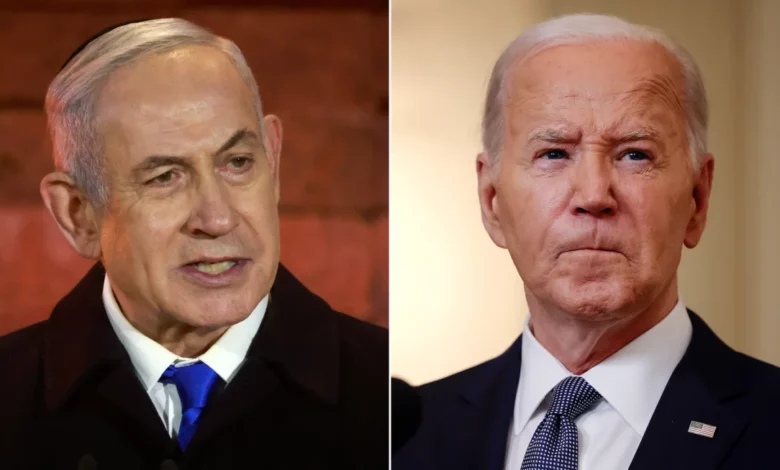
Israeli Prime Minister Benjamin Netanyahu said Saturday that the conditions for ending the country’s war in Gaza “have not changed,” raising questions over a peace proposal laid out by US President Joe Biden which he said Israel submitted.
During a speech Friday, Biden said Hamas had been degraded to a point where it can no longer carry out the type of attack seen on October 7 that launched the current war. Part of the agreement, he said, would see a truce and hostage exchange while Israel and Hamas negotiate a permanent end to the fighting.
It was perhaps the furthest Biden has gone in telling Israel its stated goals for its operation in Gaza have been met, and that the time has arrived to stop the fighting.
The proposal has been welcomed across the international community. The UN, the UK, France, Saudi Arabia and the UAE have all expressed support for Biden’s proposal, while Qatar and Egypt joined the US in calling on Israel and Hamas to “finalize” the proposed ceasefire agreement.
For its part, Hamas said it viewed the plan “positively” and is ready “to deal positively and constructively with any proposal based on a permanent ceasefire.”
But a statement from the Israeli Prime Minister’s Office on Saturday said Israel’s goals — “the destruction of Hamas military and governing capabilities, the freeing of all hostages and ensuring that Gaza no longer poses a threat to Israel” — would need to be met before a permanent ceasefire can begin.
“Under the proposal, Israel will continue to insist these conditions are met before a permanent ceasefire is put in place. The notion that Israel will agree to a permanent ceasefire before these conditions are fulfilled is a non-starter,” the statement said.
Saturday’s statement largely reiterated earlier comments from the Israeli Prime Minister’s Office (PMO) made less than an hour after Biden detailed the peace proposal on Friday, with Netanyahu insisting the country would not end the war until Hamas is defeated and all hostages had been returned.
For all the messaging, however, it is unclear exactly to what degree Israel supports the plan. The earlier PMO statement insisted the “exact outline” of the proposal allows Israel to “maintain” its goals in the conflict.
The Israeli online newspaper The Times of Israel said that Netanyahu’s statement on Saturday was geared towards outlining what kind of ceasefire agreement Israel is prepared to agree to, rather than ruling one out.
Domestic pressure mounts for Netanyahu
Netanyahu is facing domestic pressure, both from opposition leaders to get a ceasefire agreement on the table, and from ministers within his own party not to back down on Israel’s original war goals. Families of Israelis being held hostage are meanwhile urging him to accept the proposal.
Protesters took to the streets of several cities across Israel on Saturday, demanding Netanyahu’s resignation and for early elections to be held.
They also demanded the release of all hostages held in Gaza and for the Israeli government to accept the latest proposal laid out by Biden.
Families of hostages held in Gaza took part in protests in Tel Aviv, Caesaria, Haifa, Herzeliya, Kfar Saba.
At Hostage Square in Tel Aviv, protesters called the names of the 125 hostages still in Hamas captivity.
“Start streaming this deal, so that it will start moving… Start working, start acting,” a woman in Tel Aviv shouted over a loudspeaker.
In Caesarea, protesters called for Netanyahu to accept the hostage release deal that Biden presented.
“There is no victory until every last hostage is returned,” people chanted.
Israeli opposition leader Yair Lapid wrote on X Saturday that Israel’s government “cannot ignore President Biden’s significant speech.”
Lapid said he was offering Netanyahu a “safety net,” saying he would support him in securing a hostage deal if far-right ministers Itamar Ben Gvir and Bezalel Smotrich left the government.
Gvir, Israel’s National Security Minister, had previously threatened to leave Netanyahu’s coalition if a ceasefire is reached before Israel achieves its declared war aims.
Also in his speech on Saturday, Biden alluded to the tensions in the Israeli government, making a direct appeal to ordinary Israelis to voice their support for a hostage agreement that would result in a ceasefire.
“I know there are those in Israel who will not agree with this plan and will call for the war to continue indefinitely. Some, some are even in the government coalition,” he said.
The international pressure Netanyahu’s government is facing to end the war in Gaza has also been mounting, as the conflict approaches its ninth month.
The war was triggered by Hamas attacks on Israeli civilians on October 7, which left around 1,200 people dead and saw more than 200 people taken hostage. The Israeli campaign in Gaza since then has killed more than 36,000 people.
Fighting continues. This week, the Israeli military confirmed that it was operating in the centre of Rafah, southern Gaza, while a top Israeli security official warned the conflict could last into next year.




